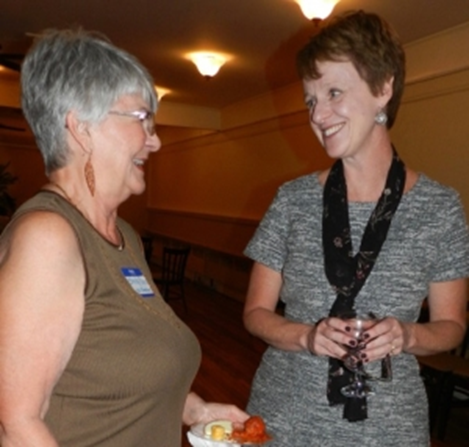An Interview with Lee Ann Colacioppo, lead editor of the Denver Post - Part One
- Bennett Michaelson
- Sep 17, 2025
- 5 min read
This is a chat with Lee Ann Colacioppo, lead editor of the Denver Post and a holder of a Pulitzer Prize, the most prestigious award you can get in journalism, for her coverage of the 2012 Aurora Shooting. She started working for the Post in 1999 and assumed the position of lead editor in 2016. I sat down and had a talk about her, her career, and her hopes for the future of journalism.
What does an editor do in your position, and why is it vital in the editorial process?
What an editor does varies a little from paper to paper, but in my position, which I think is somewhat normal, is you are responsible for understanding what the mission of your organization is, who the audience is trying to serve, what you wanna do, creating that mission, making sure everyone is on board with it, and then executing it. That can vary a lot; different papers are pretty different in what they try to do. You’re trying to set that vision, hire people that fit with that vision, and make sure that they have the space and time to execute the stories that they want to do. You (also) have responsibility for the budget of your organization, making sure you are staying within it. Typically, you also make about what stories would make the front page. You would usually edit, or at least have read about, your major stories and projects. You are tasked with holding people accountable if they don’t rise to the occasion. Most newspapers have goals of any kind, page views, subscriptions. You set those goals and you’re accountable for hitting whatever those numbers are, and you’re doing what you gotta do to make numbers happen. A lot of it, I would say, is keeping people focused so they don’t run off and do these things that you think don’t matter or you don’t think are right for your product. It varies, like I am the editor of the Denver Post, but I also am the executive editor over all the Colorado newspapers we own, so like what I might be trying to get the Longmont Times-Call to do, which is a small community paper, would be different than what I would try to do with (The Denver Post).

Via The Denver Post: Lee Ann Colacioppo, Editor of The Denver Post in her office July 14, 2016.
That’s perfect. What would you say the Denver Post’s goal is?
My goal for us, is we have a lot of competitors in Denver. TV, independent news organizations, and the Colorado Springs Gazette have a Denver Operation and a different (organization) that does politics. We have all these voices in our head, and on any given day, we have different stories, right? To me, we are very focused on stories that actually connect with people’s lives. One of our competitors is really into doing insider stuff at the statehouse, like “this was this deal” or “this person had a baby” or that kind of stuff. That is not for us. We want to do (stories about) the impact of this legislation, or I’d rather you get out into the mountains and talk to people who are affected by this bill. It seems like such an obvious goal, but we actually have a competitor who founded (itself) around this; the original founding people came out of the Denver Post, that were frustrated by that approach. They wanted to have the freedom to write the stories that they found interesting. So, we’re more outward-facing to the reader, and they’re more inward-facing.
You’ve been at the Post as long as I have been alive, and worked at papers in both Tennessee and Iowa before that. You’ve seen the evolution from cassette tapes to cloud storage over the years. How has technology most affected your line of work?
I would say it’s about the speed, definitely. When I was in Tennessee and even South Carolina, if you were working on a story and you couldn’t get a hold of somebody or couldn’t quite confirm something, and it was an hour later than you wanted, it didn’t really matter that much because you were writing it for print. They (might’ve) put it up on TV, but that didn’t matter to you, as long as you got it eventually, two hours later, that was okay. Technology, of course, really changed that. We’re all in this together. You just kind of lost that little bit of space that you had, and it also sets you up for mistakes; you have to put another whole layer of care, and (to be careful) you don’t jump the gun because you’re trying to be competitive. We’ve been interviewing for a digital position, we’ve interviewed 4 or 5 people, and we’ve been talking to them about the attack on the Pearl Street Mall in Boulder, where a guy threw a firebomb, which was a big national story, where all the local media were covering it.

Via The Denver Post: Law enforcement officials are on scene to investigate an attack on the Pearl Street Mall in Boulder, Colorado, on June 1, 2025. Multiple people were burned, some severely, during a vigil that called on Hamas to release Israeli hostages. (Photo by Helen H. Richardson/The Denver Post)
It was tricky because was it terror or wasn’t it, right? In the early days, there was a disagreement in terminology, was it anti-semetic or wasn’t it, how exactly do you label it. Some people were jumping the gun and getting called out for jumping the gun. Once you’re out there with it, pulling back is pretty hard. I heard it once described as you don’t want a “permanent exclusive,” in other words, it was wrong. In other ways, technology killed the business, so there was that. I mean, there’s just so many ways, I’d say the speed is one, and then, of course, you have to rethink your audience. Print audience and digital audience, we think they’re not the same, we know they’re not the same, we write for them separately, we treat them separately, we launch stories for them at different times, you have to think about two things now instead of one.
You told the Colorado Press Women back in 2016 shortly after you were hired as lead editor that you wanted reporters to include more voice and personality into their stories to foster a better connection with the audience. Why is using your voice to connect with your audience important, even when you are trying to keep journalistic integrity?

Lee Ann Colacioppo (Right) with the Colorado Press Women president, Sandy Nance, in 2016
Because sometimes–especially online–people can write in such a weird, formal way with police talk. One thing we want people to do is think of us as humans, not just as some “man behind the curtain.” When we write with a little personality and in a more conversational style, you come across more as “the person next door” and a person that can be trusted, not as some kind of elite in an ivory tower. I just was editing as I was getting on the phone with you a story where the person started two sentences with the word “per” meaning “according to.” I’m like, “per?” Next time you feel the need to type that word just take a break until it passes. You don’t want to overdo it (however), you don’t want to throw your opinion in a news story, but you can write like you talk. We have a reporter named Elizabeth Hernandez who is a genius at it, really. Readers love her, her numbers are huge. She’s funny and personable, and she picks stories that complement her. That girl loves a Halloween story. She can write a very strong, straight story, but she also finds ways to do it her own way.








Comments